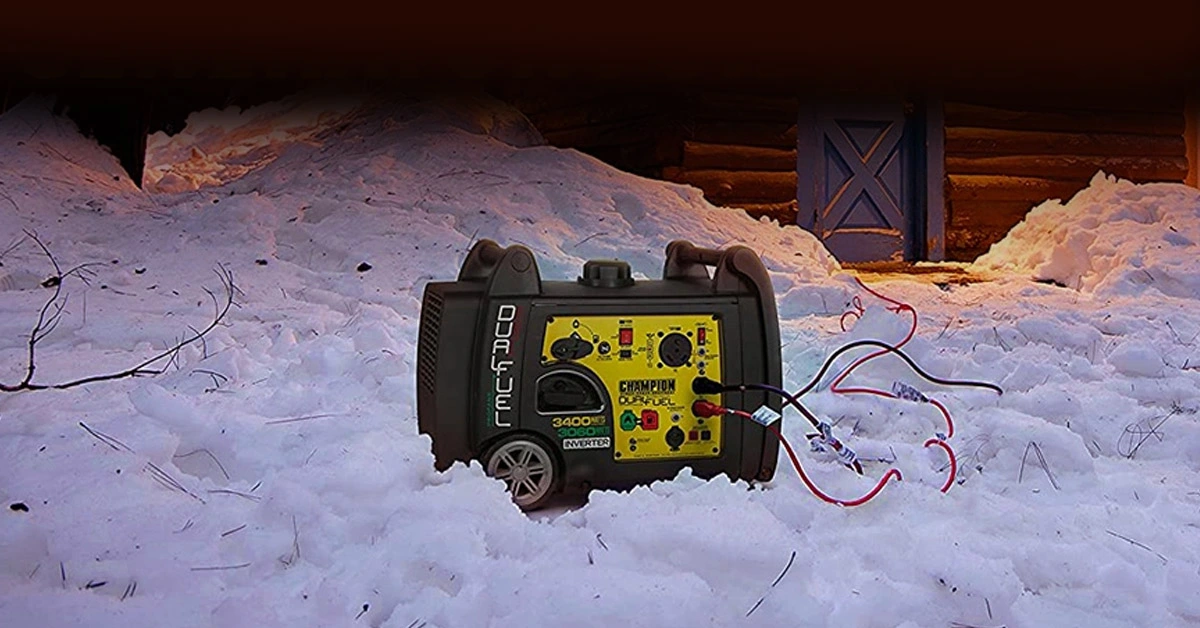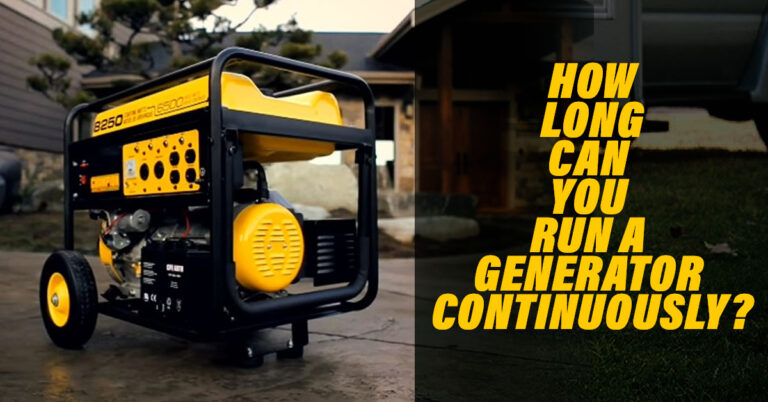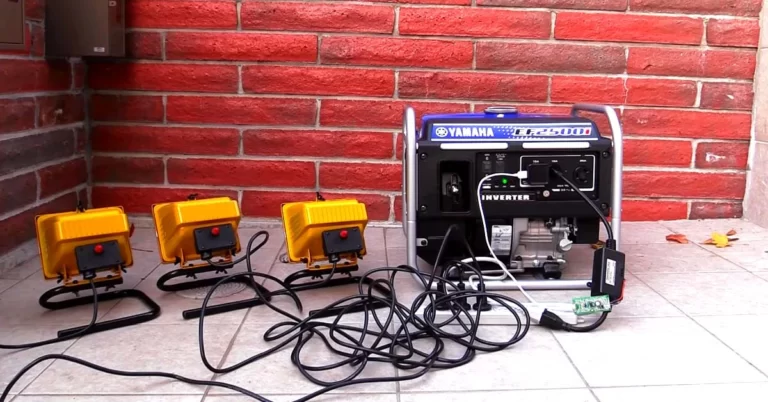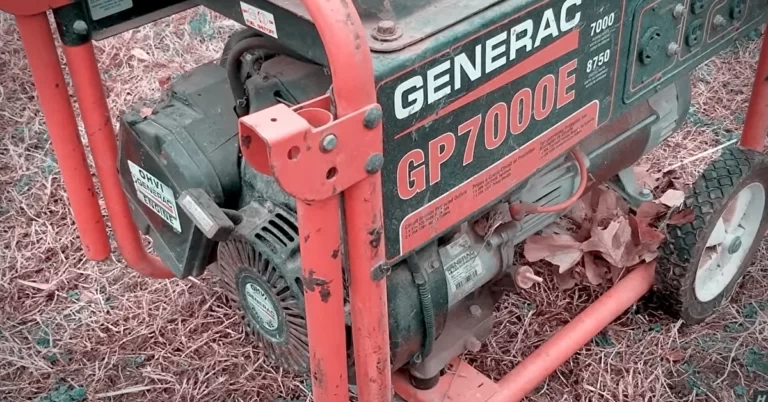How To Winterize A Generator For Cold Weather?
Preparing your generator for cold weather is essential. Key steps like fuel line draining, oil changes, spark plug removal, and proper storage are vital to prevent damage. Winterization ensures a quick and dependable generator start when needed.
This post provides valuable insights into winterizing generators, whether for seasonal or year-round standby and portable units. Get your generator ready for cold weather with these essential tips. Explore ‘How To Winterize A Generator For Cold Weather?’ now!
How To Winterizing a Standby or Portable Generator
Preparing portable or standby generators for winter before storing them away is crucial. Failure to winterize your generator can lead to damage, malfunction, and costly repairs. Here are some steps to winterize your seasonal portable generator:
Drain The Fuel Lines
To stop your backup or portable generator from freezing or getting blocked, you need to do two things:
- First, empty the fuel from the canister and pipes.
- Second, add something called a fuel stabilizer to keep the leftover gasoline in good shape when you store it. Even in really cold weather, it’s important to empty the fuel tank and lines because if gasoline sits unused for about ten days, it can go bad and damage the generator’s carburetor.
I recommend one of the finest fuel stabilizers to assist you in safely storing fuel for your generator.
STA-BIL Storage Fuel Stabilizer
Avoid cold weather problems with your backup or portable generator! Prevent fuel from freezing and causing equipment damage. Act right away: STA-BIL Storage Fuel Stabilizer can help you protect your investment by draining the fuel lines. Ensure quick starts, avoid rust, and keep fuel fresh for up to 24 months. Purchase yours now!
Clean The Carburetor
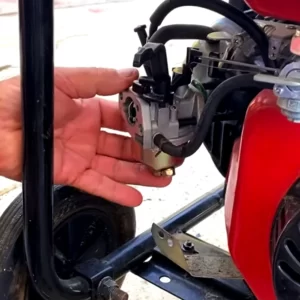
To maintain the carburetor’s performance and prevent clogging, clean it using a carburetor cleanser after removal. This step removes accumulated grime and residue. It’s recommended to clean the carburetor at the end of the season to eliminate any sludge that may have built up.
Change Oil & Filter
To keep your generator running smoothly and avoid engine problems, it’s important to regularly change the oil and oil filter. It helps remove dirt and makes sure the engine is well-lubricated when you start it. Don’t use old oil again; change it every 100 hours of use to keep the engine safe.
In cold weather, the oil can get thick and cause issues, especially if your generator has a low oil sensor that can shut it down. In order to winterize the generator and safeguard it, employ specialized winter-grade oil designed to maintain optimal flow in colder temperatures. The recommended oil should be found in your owner’s handbook.
Using winter-grade oil in the cold months helps protect your generator from freezing and makes it work better since the thinner oil is right for winter use. Below, I have a top recommendation for winter-grade oil that you should consider.
Generac Full Synthetic Motor Oil 5W-30
By routinely replacing the oil and filter, you can ensure the longevity and top performance of your generator. Use winter-grade oil to ward off cold weather problems. To protect your generator, choose Generac Full Synthetic Motor Oil 5W-30 SN Quart Bottle. Maintain your generator to provide dependable power, and don’t cut corners. Prepare for winter right away!
Remove The Spark Plug
To care for your generator properly, follow these steps:
Remove the spark plug and cover the hole to keep out dirt. If your generator uses dual fuel types and both were used, clean the fuel tank, pipes, and carburetor. If you only use one fuel type, cleaning is unnecessary. Disconnect the propane before storing it. Don’t expose the generator to snow or ice; store it in a dry place like a shed or garage. If outdoor storage is necessary, place it on a wooden platform, keep it dry, and cover it well. Some manufacturers suggest adding a little oil to the cylinder after removing the spark plug to prevent rust and maintain smooth cylinder walls.
Storage Tips
Keep the generator somewhere cold and dry. Cover it with a cover to stop dirt, dampness, or residue from building up on the generator. Finally, kindly take the charger and keep it somewhere else.
Keep the Generator Area Clear
For winterizing, Ensure your standby generator stays safe and effective by maintaining clear surroundings. Debris, like snow, ice, leaves, and branches, can block its vents, causing overheating and issues. Regularly clear away obstacles, especially in winter, leaving at least five feet of space around it.
When it snows, create a path to the generator for easy access. Also, clear a path to the house plug connected to the generator.
For portable and standby generators, maintain a debris-free zone to prevent potential fires and simplify maintenance, ensuring safety and reliability.
Schedule A Routine Tune-Up & Ceaning
Before winter, have a professional check and clean your generator regularly. They’ll inspect all parts, clean them, change fluids, and assess for issues. Ensuring a healthy battery is crucial, as cold weather can damage it. If the battery is weak, they’ll recommend replacement, ensuring your generator functions reliably in the cold.
Cold Weather Battery Solutions
In cold weather, lead-based batteries in generators may not work well. To ensure proper function, keep the battery fully charged or opt for a larger one. You can also use a warming blanket on the generator to keep the battery warm. Still, it must be connected to a power source. Alternatively, a battery warmer can prevent power loss in extreme cold. If the battery gets too low, it may not charge properly and require replacement. A battery heater is another way to safeguard battery power in cold conditions.
Generac 7101 Battery Heater Pad
Don’t allow the cold weather to drain the batteries in your generator. With the Generac 7101 Battery Heater Pad, maximise performance. It automatically maintains the ideal battery temperature, ensuring dependable starts. It is simple to install and will preserve your investment. Get the Generac 7101 Battery Heater Pad today to keep your generator ready for action!
Routine Generator Testing
Regularly running your generator is crucial to spot issues early, such as odd sounds or delays. This practice is especially wise during winter, even if there’s no power outage. Many generators self-start for 15 minutes monthly. Suppose yours doesn’t set a monthly reminder. This upkeep keeps the parts in good shape.
Additionally, test your generator every 3 months for at least 30 minutes. Neglect can reduce its efficiency, so periodic use is like charging a car battery and ensuring it’s reliable when needed.
Cold Weather Kit for Air-Cooled Home Standby Generators
Simple winter preparations for your generator! The Generac 6212 Cold Weather Kit for Air-Cooled Home Standby Generators is a wise purchase. Battery warmers and crankcase heaters can help your generator start easily, even in the cold. Get your kit today to stay charged up throughout the winter, and don’t compromise on performance!
Snow and Rain Protection
To protect your generator from snow and ice damage, avoid leaving it exposed. Rust and corrosion on its components are caused by melting snow and ice. Keep the generator in a dry garage, shed, or shelter. If that’s not possible, place it on a raised platform and cover it securely with a tarp.
If you start a portable generator in snowy conditions without proper winterization, it can be seriously damaged. Snow and water can enter the engine and electrical systems, causing flooding, electrical shorts, and corrosion, reducing the generator’s lifespan. Always ensure it’s in a snow-free and dry area before starting it to avoid costly damage.
Exercise Your Generator
Like warming up your car in winter, it’s essential to regularly run your standby generator when it’s not in use during cold weather. This 10-minute exercise each week keeps parts running smoothly and preserves the generator’s seals, ensuring it works correctly below 40°F.
Winterizing A Year-Round Generator
A year-round generator is a portable generator that you can use for various applications. Here are some steps to winterize your year-round generator:
Inspect Exhaust and Vents
In winter, maintain your generator by clearing snow from exhaust and air vents to ensure proper airflow. Check regularly for blockages. Also, clean the air filter by washing it with soapy water, rinsing, and drying overnight. Apply a small amount of oil, remove the excess, and reinstall it with the cover. Winterizing these steps will help keep your generator running smoothly and prevent damage.
Follow Recommended Maintenance Guidelines
Always refer to your generator’s manual for recommended maintenance guidelines, including oil changes, filter replacements, and spark plug replacements.
Call A Professional Technician
If you need more time to perform routine maintenance on your generator, call a professional technician to do it for you.
Winterize with Fuel Additives
Your generator will run more effectively in colder weather using winter-grade lubricant and gasoline additives. Your generator’s engine will be safe as a result.
How To Preparing the Generator For Winter
As winter draws near, ensuring your generator is adequately equipped to withstand chilly and severe weather is crucial. When the need is greatest, the generator can provide dependable power thanks to the careful planning that can help avoid harm to the engine and electrical system. To prepare your generator for the winter, take the following steps:
Choose A Snow-Free And Rain-Free Area
When positioning your generator, choosing a location free from snow and rain is important to prevent damage to the engine and electrical components. Choose an area that is elevated and away from potential flooding.
Check The Battery Charge
Cold weather can drain batteries quickly, and it’s crucial to check their condition. A weak or dead battery won’t start the generator. In cold temperatures, batteries perform poorly and may need replacement if they can’t hold a charge. Monitoring battery health is vital, especially as problems often arise below 40 degrees Fahrenheit.
Block Heater
In really cold places, you can use an engine block heater or water jacket heater to keep the engine warm and make it start easily in the cold. But remember, not all block heaters work with every generator, so follow what the manufacturer suggests.
There are three different varieties of these heaters:
- Tank-style heaters
- Freeze plugs
- Radiator hose
They help the engine last longer, save fuel, reduce pollution, and prevent water from gathering in the oil pan. If the block heater breaks, the generator can give an alert for low coolant temperature or over-cranking if the engine doesn’t start right.
Install Additional Gear
You might need to add equipment, such as engine block warmers, heating pads, or frigid winter packages, to winterize your generators, depending on where you live. These could aid in preventing harm from the weather and keeping the engine toasty.
Please Read The User’s Manual
Every generator is different, so it’s essential to read the manual to ensure that the steps you take are compatible with your particular generator. The manual will provide specific instructions for winterizing your generator, including any additional steps necessary for your particular model.
Diesel Fuel
When it’s very cold, diesel fuel can turn into a thick and cloudy liquid due to something called paraffin wax. These wax crystals can stick together and clog the filters in your generator, making it stop working. If it gets even colder, the fuel can become a solid and not flow at all, which starts to happen around 10-15 degrees Fahrenheit. Water in the fuel can also freeze and block the filters. To avoid these problems, you should take good care of your fuel by using treatments and testing it.
Pro-Tips For Using A Generator During Winter
Here are some additional pro tips for using a generator during winter:
Check Before Starting – Warm-Up Period
Before starting your generator, check:
- Is there enough fuel?
- Does it have sufficient oil?
- Are any parts frozen from snow? Once confirmed, start the generator and let it run for 15-20 minutes without connecting devices to warm up the engine and fluids, preventing damage.
Use A Fuel Stabilizer

A gasoline stabilizer will maintain the fuel in good condition and stop it from deteriorating or clogging the carburetor. It’s crucial to keep the generator in storage for a long time.
Use The Right Fuel
Use the correct type of fuel (oil) the manufacturer recommends. Use gasoline with a higher octane rating in winter, and consider using a winter-grade oil for the engine.
Keep The Generator Dry
Avoid using it in wet conditions, and always keep it dry to prevent electrical shorts or damage to the engine.
Keep it Lubricated
Maintaining proper lubrication is essential for your winter generator care. Frequent oil checks ensure efficient and heat-free operation. For example, new DuroMax generators require an initial oil change after 6-8 hours, followed by oil changes every 20 hours of use (50 hours for XP15000E and XP15000EH). The methods for changing the oil are to use a pan to drain the old oil, replace the drain bolt, and then refill with 10w30 motor oil.
Mobil 1 Advanced Full Synthetic Motor Oil 10W-30
Maintaining appropriate lubrication will help your generator work smoothly throughout the winter. Keep up with routine oil checks. Replace the oil in DuroMax generators after 20 hours of operation. For the best engine protection, pick Mobil 1 Advanced Full Synthetic Motor Oil 10W-30. Maintaining your generator in top shape will prevent you from compromising performance. Purchase Mobil 1 right away!
Invest On Cover
Invest in a generator cover to prolong its life and maintain its appearance in cold weather. Covers shield your generator from rain, cold, water damage, corrosion, dust, and debris. DuroMax offers various weather-resistant covers for generators of different sizes. Below, I’ve highlighted an exceptional generator cover for your consideration.
Use a high-quality cover to shield your generator from the corrosive elements of winter. Among the robust alternatives provided by DuroMax is the Porch Shield Waterproof Universal Generator Cover. Keep your generator clean, dry, and corrosion-free. Don’t wait; invest in its longevity right now with this superb cover!
Stock Up Fuel
Get enough fuel for emergencies during winter. Some generators can use gasoline or propane. Propane can last up to 30 years. Store your fuel in a secure, cool, and dry location, and ensure you use the best generator cans to safeguard your fuel. Use a fuel stabilizer to prevent the fuel from spoiling if you leave it in the generator. Take a look at one of the top-rated fuel tanks available on Amazon, simplifying your life and making your choice easier.
With a variety of fuel supply choices, you can be ready for winter situations. If you want a long-lasting fix, think about propane. Use high-quality fuel stabilisers and storage cans to protect your fuel. The Sceptre Flo N’ Go Duramax 14 Gallon Portable Gas Fuel Tank Container will simplify your decision. Please don’t put off securing your fuel supply until it is too late.
Monitor The Generator’s Performance
Keep a watch on its operation and occasionally inspect it for any indications of harm, leaks, knocking, or odd sounds. If there are any problems, stop the generator immediately and contact an experienced expert.
Inspect For Damage and Leaks
Inspect your generator for rust, dents, oil or fuel leaks, and broken wires. Using a damaged generator can be risky, so get professional help for repairs. Fixing small problems can prevent bigger, costlier issues down the road or even the need to replace your generator.
How To Winterize a Commercial Diesel Generator
Here are the key points for winterizing a commercial diesel generator:
- Conduct a thorough inspection for wear and damage.
- To preserve engine performance, clean or change the oil filter.
- Change the engine oil regularly to ensure lubrication.
- Care for the diesel fuel system with stabilizers and proper storage.
- Test the generator’s performance before winter storage.
- Consult a professional for expert inspection and servicing.
Why Should You Winterize Your Generator?
Winterizing your generator is vital. It ensures backup power in winter, extends the engine’s life, and maintains effective operation in harsh conditions. Regular prep and maintenance are essential for smooth performance.
What Happens to My Generator if Disregard These Signs?
Neglecting warning signs of generator issues can lead to delayed start, computer system failure, business interruptions, and food spoilage. Installing a propane backup generator is a wise step to prepare for winter outages. Contact Our Generators’ customer representatives for winterization guidance.
FAQs
-
How often should I winterize my generator?
It is recommended to winterize your generator once a year before the cold season arrives.
-
Can I use my generator during a snowstorm?
Using your generator during a snowstorm or heavy rain is not recommended to avoid electrical hazards.
-
Can I store my generator in a shed during winter?
It is best to store your generator in a dry, covered area with proper ventilation during winter. A shed may not provide enough ventilation and could be a fire hazard.
-
Can I use regular gasoline for my generator during winter?
It is recommended to use winter-grade gasoline or add a winter fuel additive to your generator’s gasoline tank during winter to prevent fuel gelling and other issues.
-
Should I run my generator periodically during winter?
It is recommended to run your generator periodically during winter to keep the engine and electrical system lubricated and prevent fuel deposits.
-
Can I use my generator inside my house or garage during winter?
No, using a generator inside your home or carport is dangerous. Carbon monoxide, a poisonous gas that can be fatal when breathed in high quantities, is produced by generators. Continuously operate your generator outside, away from confined spaces, in a well-ventilated location.
-
How often should I change the oil in my generator during winter?
The frequency of oil changes in a generator depends on the manufacturer’s recommendations and how often the generator is used. During winter, it is generally recommended to change the oil every 50-60 hours or at least once per season, whichever comes first. However, it would help if you always referred to the user manual for your specific generator model for the recommended maintenance schedule.
-
Can I use regular gasoline in my generator during winter?
Generators should use winter-grade petroleum to prevent fuel lines from freezing and ensure optimum motor performance. With ethanol added to winter-grade fuel, which has a reduced freezing point, moisture is absorbed, and ice is avoided. Fuel stabilizers and additives can also extend the fuel’s efficacy and storage life.
Conculsion
Knowing ‘How To Winterize A Generator For Cold Weather’ is crucial for ensuring peak performance in freezing conditions. To protect your generator and make sure it works when you need it, you should winterize it. Whether you run the generator all year long or only during specific seasons, winterization is crucial. It helps prevent damage and makes the generator last longer.
Follow recommended steps, such as removing spark plugs, changing oil, and replacing filters while keeping spark plugs dry to prevent moisture buildup. To be prepared for harsh winter conditions, keep the generator area clear and schedule regular tune-ups. It would help if you also thought about getting extra winterization equipment.

